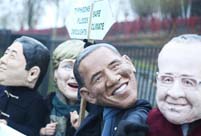CAIRO, Nov. 24 -- Egypt's interim President Adly Mansour approved on Sunday a law regulating protests in the country, official news agency MENA reported.
The controversial protest law was submitted to the president by the cabinet for review two weeks ago.
The approval comes as university students in several governorates have been staging protests to mark 100 days since the dispersal of two Cairo protest camps demanding the reinstatement of ousted president Mohamed Morsi.
According to the law, organizers of all public meetings have to offer a written notice to the interior ministry three days before the meeting. They are required to detail the reasons for the protest, information about the organizers, a review of the slogans to be used, along with the place and time of the protests.
The interior ministry has the right to cancel a protest 24 hours before its beginning if it feels that the protest may represent a threat to security, the law states, and it can change the place or the course of a march. The law outlined that in the case of a refusal, organizers can appeal to the Court of First Instance that will respond to requests quickly.
The law also prohibits holding meetings for political reasons inside places of worships, marching to or from worship places and gatherings where participants carry weapons, explosives, fireworks, incendiary devices or anything that can expose individuals and facilities to risk. The law also bans wearing masks or hiding one' s face during protests.
The law also gives the interior ministry the right to disperse any public meeting if it violates these rules or represents a perceived security risk. The security forces are required to issue warnings and if protesters fail to respond, they are permitted to use crowd-control weapons such as water cannons, batons and tear gas.
As a last resort, security forces can use rubber bullets and birdshot to disperse protesters. If demonstrators use weapons, the security forces are permitted to use "the necessary means" to deal with any threats they face. The law also gives the officials the right to ban any protests in front of vital government offices, military sites and archaeological sites.
Under the law, governors have the right to allocate special safe venues in every governorate for people to gather to express their grievances without offering a notice to security.
Presidential spokesman Ihab Badwy said that the aim of the new law is to protect peaceful protesters; however, some human rights groups have condemned the law.
"The law... gives the state free hand to disperse peaceful gatherings by use of force," the Egyptian Initiative for Personal Rights and other local human rights groups contended in a joint statement.
Mass street protests led to the toppling of former president Hosni Mubarak in 2011 and two years later, another mass protest backed by the military ousted Islamist president Mohamed Morsi.
 Finland has more eggs in the Chinese basket than any other
Finland has more eggs in the Chinese basket than any other In pictures: PLA's digital equipment
In pictures: PLA's digital equipment  Protesters demonstrate during UN Climate Change Conference in Poland
Protesters demonstrate during UN Climate Change Conference in Poland  Self-made farmer billionaire donates 69 villas at hometown
Self-made farmer billionaire donates 69 villas at hometown Demolition of bizarre rooftop villa in Beijing still in progress
Demolition of bizarre rooftop villa in Beijing still in progress Service seminar for E China train attendants
Service seminar for E China train attendants  Supermodel-turned-designer
Supermodel-turned-designer Cheerleaders light up CBA regular season
Cheerleaders light up CBA regular season  Finland--anytime you want is right time to go: Ambassador
Finland--anytime you want is right time to go: Ambassador Maritime counter-terrorism drill
Maritime counter-terrorism drill College students want partner for sex needs
College students want partner for sex needs Male belly dancer in women’s fitness club
Male belly dancer in women’s fitness club  15 best rivers for travelers in world
15 best rivers for travelers in world National Geographic Traveler Photo Contest
National Geographic Traveler Photo Contest Weekly Sports Photos
Weekly Sports PhotosDay|Week|Month